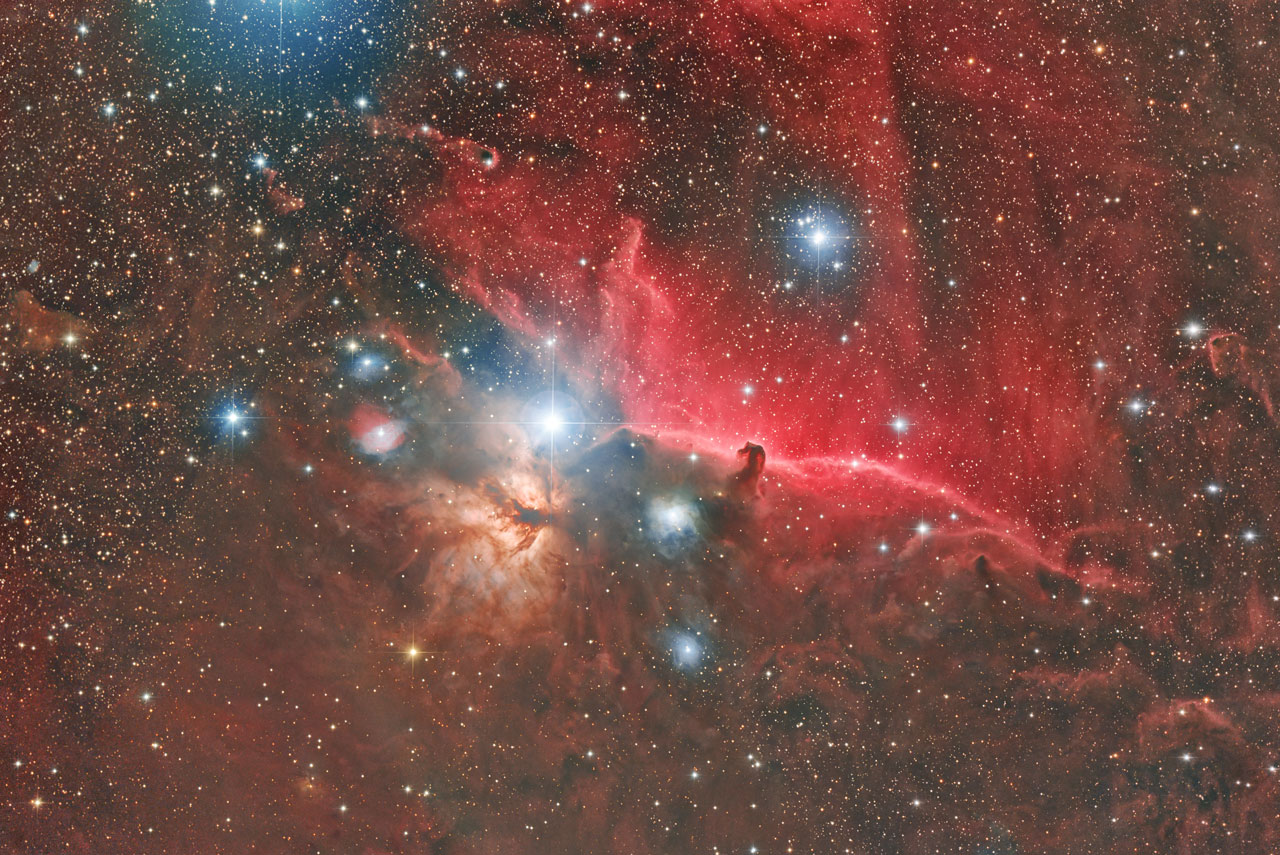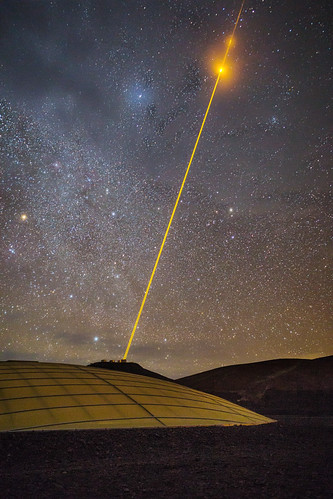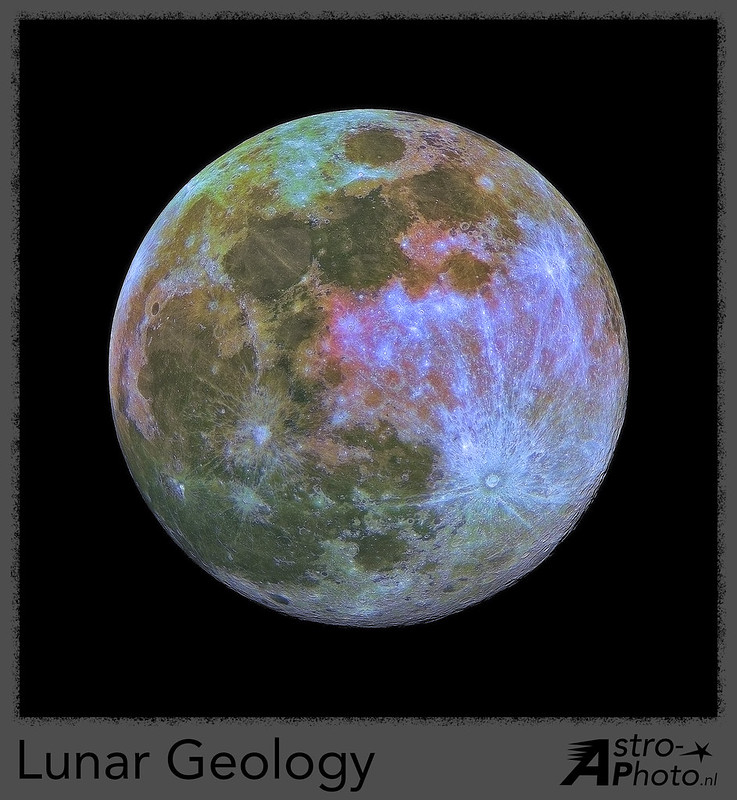Page 1 of 4
Submission: 2019 March
Posted: Fri Mar 01, 2019 6:05 pm
by bystander
__________________________________________________________________________________________________
Please post your images here.
Please see
this thread before posting images; posting images demonstrates your agreement with
the possible uses for your image.
If hotlinking to an image, please ensure it is under 400K.
Hotlinks to images over 400K slow down the thread too much and will be disabled.
Thank you!
_________________________________________________________________________________________________
<- Previous submissions
Re: Submission: 2019 March
Posted: Fri Mar 01, 2019 6:38 pm
by markh@tds.net
Hubble's Variable Nebula - NGC 2261
Copyright Mark Hanson
Description by "Sakib Rasool"
"Like a cosmic flower, Hubble's Variable Nebula is a lovely reflection that appears to sprout from the bright star R Monocerotis. Otherwise catalogued as NGC 2261 by the astronomer John Louis Emil Dreyer in 1888 in his iconic New General Catalogue, this nebula was discovered in 1783 by William Herschel. It is also famous for the being the first deep sky object to have been photographed with the Hale Telescope at the Palomar Observatory in 1949 by none other than Edwin Hubble.
The popular name of this nebula arises from it being studied by Edwin Hubble in 1916 who noticed it changed in brightness. It is now known that its dramatic and quite quick changes in brightness and appearance are the result of opaque clouds of dust situated between the star and the nebula. The appearance of NGC 2261 has been observed to change on timescales of a few months if not a few days!
The reddish nebulosity visible to the north of NGC 2261 is an example of a Herbig Haro object, a type of jet ejected by a young star that glows by the energy generated by the gas colliding with its surrounding space. They were originally independently discovered by the astronomers George Herbig and Guillermo Haro. This Herbig Haro object is catalogued as HH 39 and more than a thousand are currently known. An analysis of the proper motion of the knots in HH 39 show that it is moving away from R Monocerotis and NGC 2261."
LRGBHa 300,180,180,180,450 Taken with a PlaneWave 24" CDK from Animas New Mexico.
You can see the full versions here:
https://www.hansonastronomy.com/hubble-veriable-nebula
Thank you,
Mark
Re: Submission: 2019 March
Posted: Fri Mar 01, 2019 7:21 pm
by IO_12
Comet C/2018 Y1 Iwamoto between nebulae and star clusters
C/2018 Y1 Iwamoto on 28.02.2019 between IC 417 and open clusters M 38 and NGC 1907
Copyright: Velimir Popov, Emil Ivanov
Irida Observatory
More info and hi-res images on
website
Re: Submission: 2019 March
Posted: Fri Mar 01, 2019 7:57 pm
by tommy_nawratil
M78 complex LRGB with 10" Lacerta Photonewton
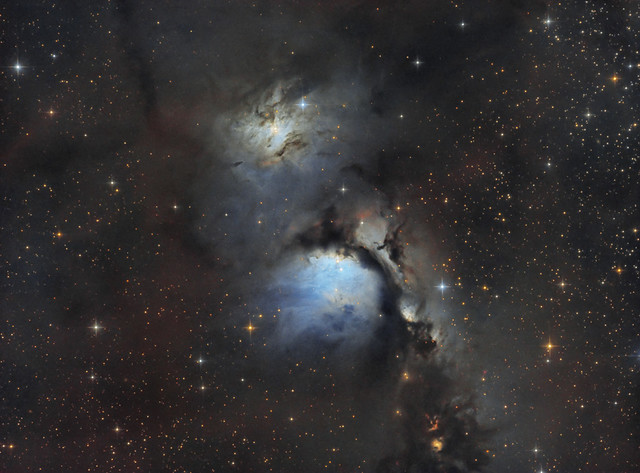
full size and data
https://www.astrobin.com/391831/ image of the day

the Pipe with 300mm Fullframe
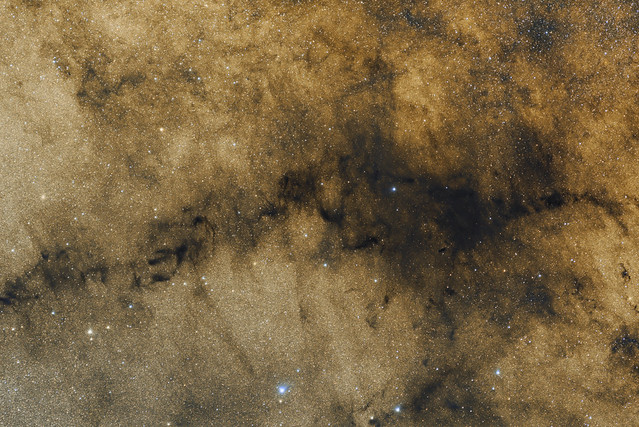
full size and data
https://www.astrobin.com/388309/
thanks for viewing and clear skies!
Tommy
Re: Submission: 2019 March
Posted: Sat Mar 02, 2019 4:59 am
by Ann
markh@tds.net wrote: ↑Fri Mar 01, 2019 6:38 pm
Hubble's Variable Nebula - NGC 2261
Copyright Mark Hanson
HVN-LRGBsmall.jpg
HVN-LRGBHasmall.jpg
Description by "Sakib Rasool"
"Like a cosmic flower, Hubble's Variable Nebula is a lovely reflection that appears to sprout from the bright star R Monocerotis. Otherwise catalogued as NGC 2261 by the astronomer John Louis Emil Dreyer in 1888 in his iconic New General Catalogue, this nebula was discovered in 1783 by William Herschel. It is also famous for the being the first deep sky object to have been photographed with the Hale Telescope at the Palomar Observatory in 1949 by none other than Edwin Hubble.
The popular name of this nebula arises from it being studied by Edwin Hubble in 1916 who noticed it changed in brightness. It is now known that its dramatic and quite quick changes in brightness and appearance are the result of opaque clouds of dust situated between the star and the nebula. The appearance of NGC 2261 has been observed to change on timescales of a few months if not a few days!
The reddish nebulosity visible to the north of NGC 2261 is an example of a Herbig Haro object, a type of jet ejected by a young star that glows by the energy generated by the gas colliding with its surrounding space. They were originally independently discovered by the astronomers George Herbig and Guillermo Haro. This Herbig Haro object is catalogued as HH 39 and more than a thousand are currently known. An analysis of the proper motion of the knots in HH 39 show that it is moving away from R Monocerotis and NGC 2261."
LRGBHa 300,180,180,180,450 Taken with a PlaneWave 24" CDK from Animas New Mexico.
You can see the full versions here:
https://www.hansonastronomy.com/hubble-veriable-nebula
Thank you,
Mark
Thank you, Mark I like both versions of your image. Am I right to suppose that the red background in one of the images is scattered Hα?
Ann
Re: Submission: 2019 March
Posted: Sat Mar 02, 2019 5:43 am
by markh@tds.net
Ann wrote: ↑Sat Mar 02, 2019 4:59 am
markh@tds.net wrote: ↑Fri Mar 01, 2019 6:38 pm
Hubble's Variable Nebula - NGC 2261
Copyright Mark Hanson
HVN-LRGBsmall.jpg
HVN-LRGBHasmall.jpg
Description by "Sakib Rasool"
"Like a cosmic flower, Hubble's Variable Nebula is a lovely reflection that appears to sprout from the bright star R Monocerotis. Otherwise catalogued as NGC 2261 by the astronomer John Louis Emil Dreyer in 1888 in his iconic New General Catalogue, this nebula was discovered in 1783 by William Herschel. It is also famous for the being the first deep sky object to have been photographed with the Hale Telescope at the Palomar Observatory in 1949 by none other than Edwin Hubble.
The popular name of this nebula arises from it being studied by Edwin Hubble in 1916 who noticed it changed in brightness. It is now known that its dramatic and quite quick changes in brightness and appearance are the result of opaque clouds of dust situated between the star and the nebula. The appearance of NGC 2261 has been observed to change on timescales of a few months if not a few days!
The reddish nebulosity visible to the north of NGC 2261 is an example of a Herbig Haro object, a type of jet ejected by a young star that glows by the energy generated by the gas colliding with its surrounding space. They were originally independently discovered by the astronomers George Herbig and Guillermo Haro. This Herbig Haro object is catalogued as HH 39 and more than a thousand are currently known. An analysis of the proper motion of the knots in HH 39 show that it is moving away from R Monocerotis and NGC 2261."
LRGBHa 300,180,180,180,450 Taken with a PlaneWave 24" CDK from Animas New Mexico.
You can see the full versions here:
https://www.hansonastronomy.com/hubble-veriable-nebula
Thank you,
Mark
Thank you, Mark I like both versions of your image. Am I right to suppose that the red background in one of the images is scattered Hα?
Ann
Ann, Yes the first image has no Ha in it but the second one has Ha added. Thanks, Mark
Re: Submission: 2019 March
Posted: Sat Mar 02, 2019 6:53 am
by jjimenezpp
Comet C/2018 Y1 Iwamoto & IC410 & IC405
Comet C / 2018 Y1 Iwamoto as it passes through the area of the nebulae of the tadpoles IC410 and the Flame IC405
Date 2019 02 28
La Jonquera - Girona - Spain
Canon 6D + Star71
RGB - 4 x 90" ISO 12800
H, S, O - 7x900" ISO 3200
Large image
Large image, annotated version
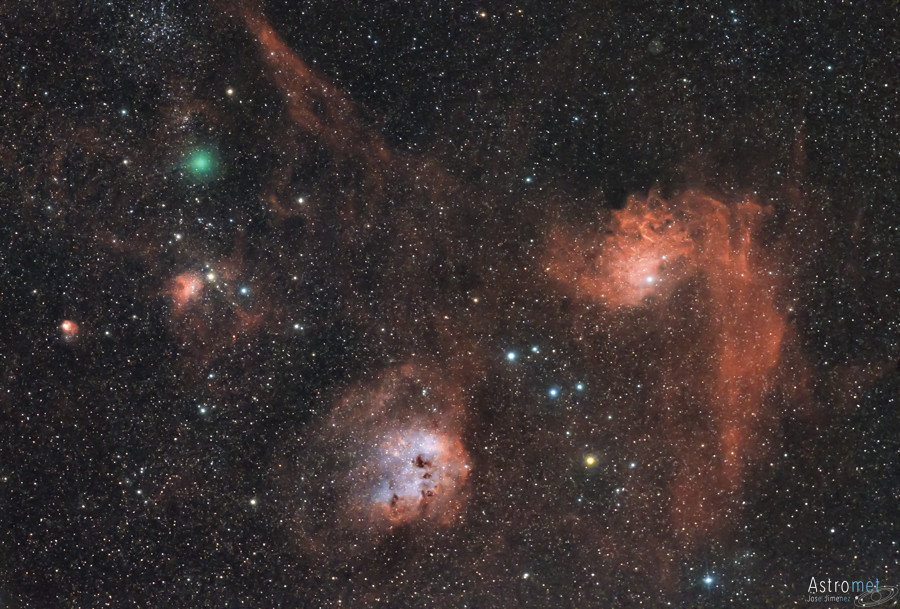
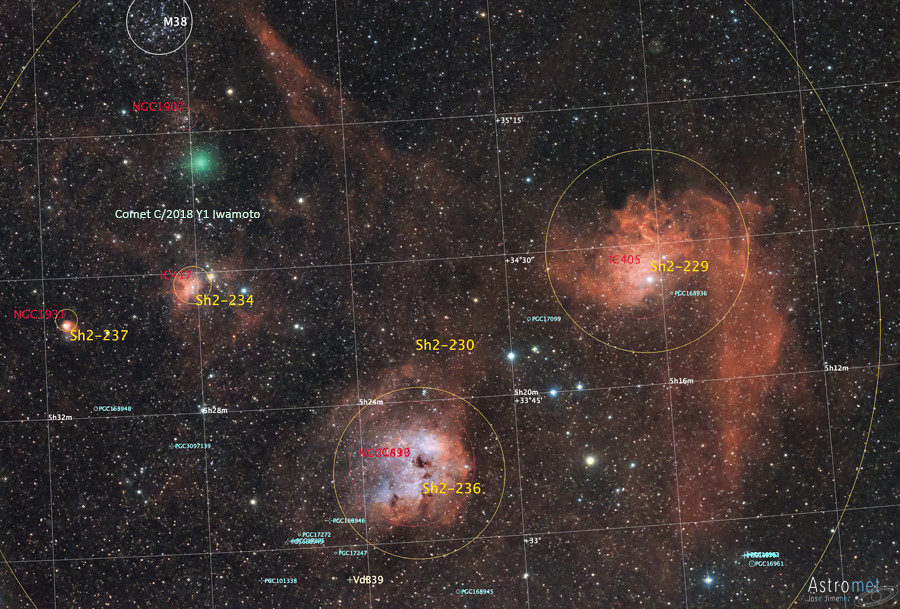 José Jiménez
José Jiménez
Re: Submission: 2019 March
Posted: Sat Mar 02, 2019 6:53 am
by jjimenezpp
Comet C/2018 Y1 Iwamoto & IC410 & IC405
Comet C / 2018 Y1 Iwamoto as it passes through the area of the nebulae of the tadpoles IC410 and the Flame IC405
Date 2019 02 28
La Jonquera - Girona - Spain
Canon 6D + Star71
RGB - 4 x 90" ISO 12800
H, S, O - 7x900" ISO 3200
José Jiménez
Re: Submission: 2019 March
Posted: Sat Mar 02, 2019 7:19 am
by HHV
Medusa Nebula with the DSLR:
Used a cold night in February to collect photons of that faint planetary nebula in the constellation Gemini with a 10inch Newtonian reflector and APS-C sized DSLR.
Re: Submission: 2019 March
Posted: Sat Mar 02, 2019 2:06 pm
by IO_12
Comet C/2018 Y1 Iwamoto
on March 1st 2019 near IC 405 (Flaming Star Nebula)
Copyright: Velimir Popov, Emil Ivanov
Irida Observatory
More info and hi-res images on
website
Re: Submission: 2019 March
Posted: Sat Mar 02, 2019 6:35 pm
by -Amenophis-
Rosette nebula
Copyright: Thomas LELU

Re: Submission: 2019 March
Posted: Sat Mar 02, 2019 7:49 pm
by SpookyAstro
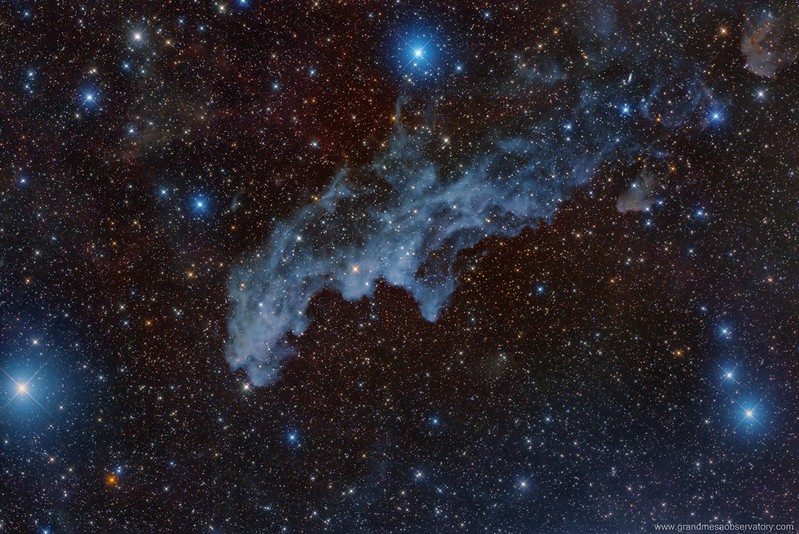 Witch Head Nebula from Grand Mesa Observatory
Witch Head Nebula from Grand Mesa Observatory by
Transient Astronomer, on Flickr
Image Credit and Copyright: Grand Mesa Observatory, Terry Hancock, Tom Masterson
Re: Submission: 2019 March
Posted: Sun Mar 03, 2019 12:57 pm
by rwittich_de
Horsehead and Flame
by Reinhold Wittich
Comet C/2018Y1 Iwamoto in Auriga
Posted: Sun Mar 03, 2019 3:13 pm
by cfm2004
Località: San Romualdo - Ravenna
Tecnosky AG70 su ASA DDM60PRO
QSI583ws raffreddata -20 - Filtri RGB Astrodon RGB GenII E-series
HA-RGB: HA (15x7' Bin2), R (15x2'), G (14x2'), B (14x2') in Bin1
Cristina Cellini
Orion at your feet
Posted: Mon Mar 04, 2019 2:09 am
by alcarreño
Copyrights: Raul Villaverde & Domingo Pestana
 Reflejos
Reflejos by
Raul Villaverde, en Flickr
Messier 97 & 108
Posted: Mon Mar 04, 2019 9:37 am
by alcarreño
Copyright: Raul Villaverde Fraile
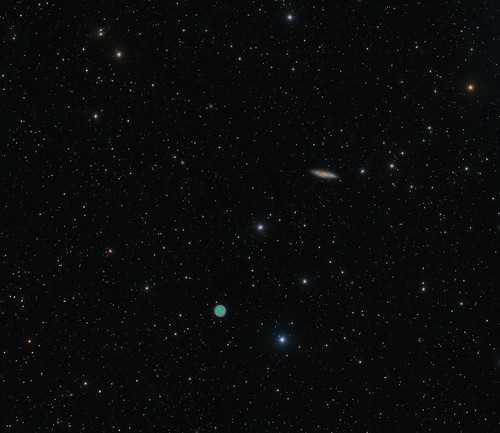 Messier 97-108
Messier 97-108 by
Raul Villaverde, en Flickr
Re: Submission: 2019 March
Posted: Mon Mar 04, 2019 5:17 pm
by vendetta
Re: Submission: 2019 March
Posted: Mon Mar 04, 2019 7:37 pm
by HHV
Starting the galaxy season - NGC 2903:
The spiral galaxy NGC 2903 in the constellation Leo has been my first target in the 2019 galaxy season. Imaged with a 10inch Newtonian reflector and APS-C sized DSLR, right from my garden.
Clavius and Blancanus
Posted: Tue Mar 05, 2019 8:08 am
by Luc CATHALA
Hello
I submit you this Clavius and Blancanus picture.
Very little time in a life the sky allows in the Rhône valley in France to exploit almost fully the capabilities of large telescopes like my newton 24" that I built. It lasted 20 minutes on the night of February 15. I was able to image some craters like them in high resolution. The focal length used is 10920 mm (barlow 4), red filter 610, camera QHY5-III 178M.
Clear skies.
Luc CATHALA

Full résolution :
https://cdn.astrobin.com/thumbs/vCIblZK ... hqkGbg.jpg
Re: Submission: 2019 March
Posted: Thu Mar 07, 2019 12:04 pm
by jjimenezpp
Rosette Nebula to Cone Nebula
Mosaic Rosette Nebula to Cone Nebula in SHO
Date February 2019
La Jonquera - Girona - Spain
Canon 6D + Star71+ Optolong Narrowband filters, H-alpha, OIII & SII
6x900" x 3 ISO 3200
Large image
Large image, annotated version
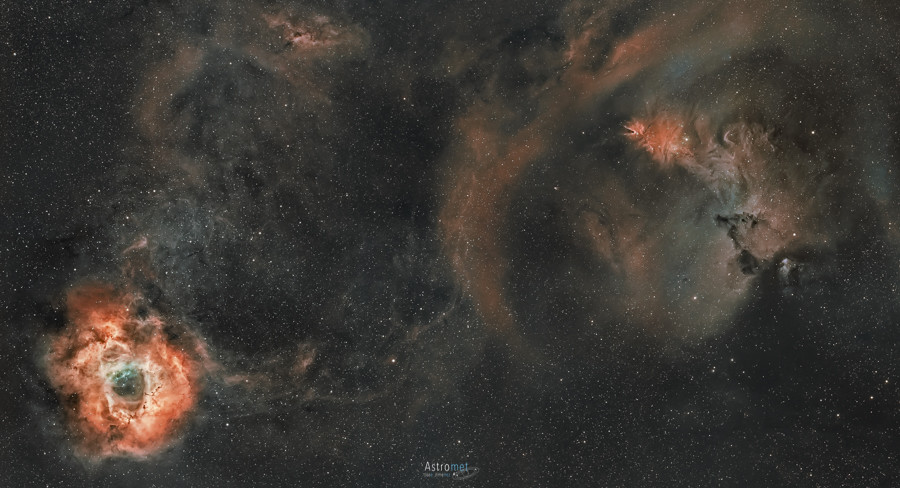
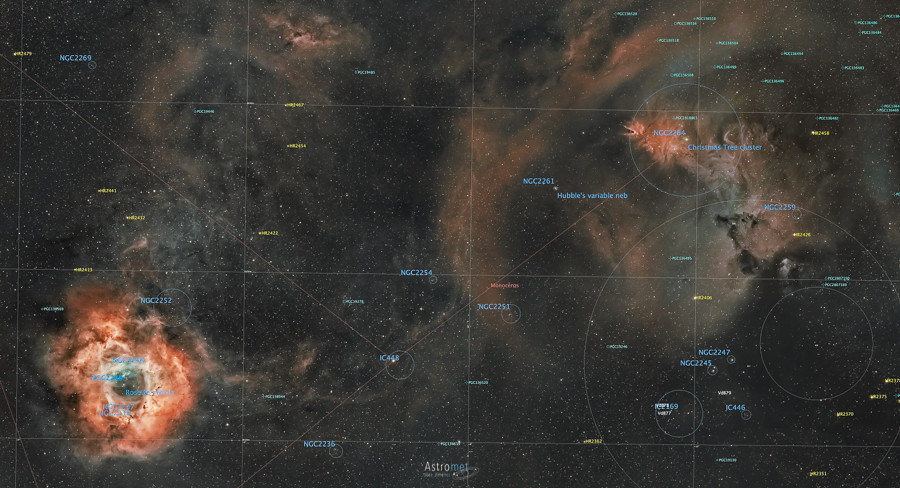 José Jiménez
José Jiménez
Fire in the sky (NGC 2024)
Posted: Thu Mar 07, 2019 5:24 pm
by aldomottino
Images in Ha and Ha+RGB (zoomed).
Copyrigh: Aldo Mottino
Re: Submission: 2019 March
Posted: Thu Mar 07, 2019 9:35 pm
by avdhoeven
Re: Submission: 2019 March
Posted: Fri Mar 08, 2019 9:38 am
by HHV
NGC 3718 - twisted galaxy in Ursa Major:
Used my 10inch Newtonian reflector and DSLR to capture that lovely galaxy which interacted in the past with its neighbour NGC 3729 to get that specific shape. Also of interest the far distant galaxy group south of NGC 3718 called Hickson 56.
Re: Submission: 2019 March
Posted: Fri Mar 08, 2019 7:34 pm
by jjimenezpp
Simeis 147 Spaghetti Nebula
Sh2-240 - Simeis 147 in SHO + RGB
Date February 2019
La Jonquera - Girona - Spain
Canon 6D + Star71+ Optolong Narrowband filters, H-alpha, OIII & SII
6x1500" H-alpha - ISO 3200
6x1500" SII - ISO 3200
6x1500" OII - ISO 3200
15x600" RGB - ISO 1600
Flats, Darks & Bias
Large image
Large image, annotated version

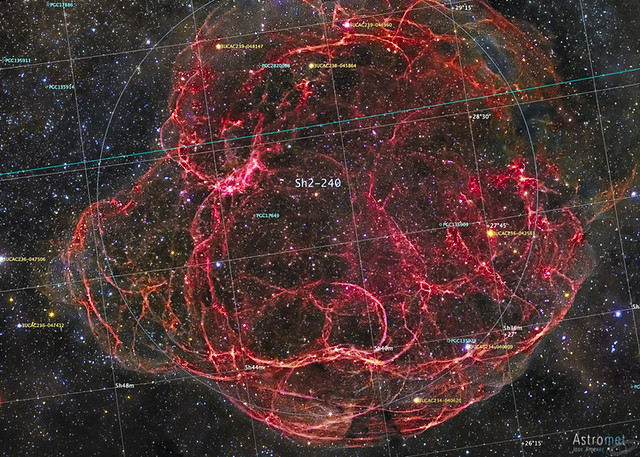 José Jiménez
José Jiménez
Re: Submission: 2019 March
Posted: Fri Mar 08, 2019 8:34 pm
by jf313084
Hi my name is Josef and I'm an 18 year old photographer from Cornwall.
I thought you might like this shot that I took at about 4am this morning!










